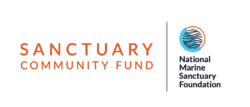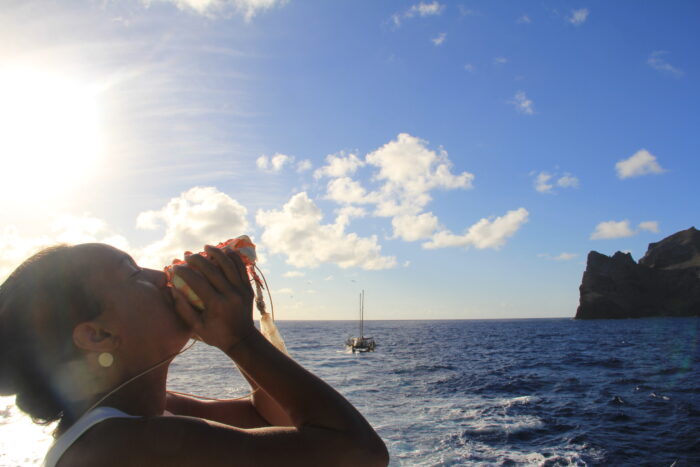Sanctuary Community Fund

Second round information and application timeline coming soon, stay tuned.
To increase public support, long-term protection, and sustainable use of national marine sanctuaries and other protected waters, the National Marine Sanctuary Foundation is creating the Sanctuary Community Fund to invest directly in community partner engagement so that the heart of sanctuaries – the peoples, places, customs, and cultures – can help advance science and ways of knowing, stewardship, and outreach within the sanctuary community and beyond.
Through the Sanctuary Community Fund, the Foundation will deliver funding to local communities and groups within those communities that will support the discovery, testing, piloting, nurturing, capacity, and spread of the best ideas to protect our ocean and Great Lakes. To maximize the effectiveness of this community-based grant program, the Foundation will conduct robust RFP outreach and provide grant training opportunities that will increase participation of diverse sectors of the community, particularly inclusion of the indigenous and underrepresented groups who are intrinsically linked to our waters.
Our national marine sanctuaries and marine national monuments are ideal places to focus attention and efforts to improve ocean justice, advancing health and prosperity for communities connected to the ocean, coasts, and Great Lakes and for the whole country. As our Nation’s network of protected waters centered in community-based, comprehensive ecosystem management, these are key opportunities to increase engagement with historically underrepresented and marginalized communities.
The initial funds are included as part of a 2023 announcement from the Biden-Harris Administration of investments through NOAA to address coastal climate resilience and protect marine resources through the Inflation Reduction Act. The Foundation will leverage that funding to seek complementary private investment in the Sanctuary Community Fund, to create a collaborative impact model that utilizes the power of public-private partnership to solve the biggest challenges facing our National Marine Sanctuary System and its watersheds.

HOW TO PARTICIPATE
The first round of grants will support community partners who want to advocate and advance the sites currently in the national marine sanctuary designation process and initial establishment of new sites, but do not have the resources to do so. Partners in communities serving sanctuaries that are currently in the Sanctuary Designation Process through NOAA or have already been designated by NOAA after June 1, 2024 will be eligible to apply. This includes:
- Lake Ontario National Marine Sanctuary;
- Chumash Heritage National Marine Sanctuary;
- Proposed Hudson Canyon National Marine Sanctuary;
- Proposed Lake Erie Quadrangle National Marine Sanctuary;
- Proposed Pacific Remote Islands National Marine Sanctuary; and
- Proposed National Marine Sanctuary within Papahānaumokuākea Marine National Monument.
Past engagement roles and actions will not impact any organization’s eligibility for a grant award.
Future iterations of this grant program are intended to expand beyond designations in progress to the entire National Marine Sanctuary System.
The Foundation released the initial Request for Proposals (RFP) for the Sanctuary Community Fund on October 7, 2024, on our website at marinesanctuary.org. The RFP includes specific instructions for applications. The Foundation will also host two virtual workshops during the application window, to ensure an inclusive funding life cycle that sets reasonable expectations and offers intensive guidance for the application to organizations new to the grant-seeking and grant administration process. Award announcements will be made before the end of the year, and projects will be able to start project work as of January 1, 2025.
The Foundation anticipates awarding $2M from the Sanctuary Community Fund over two years, with multiple opportunities to apply for funding.
The Sanctuary Community Fund will work to achieve specific outcomes including but not limited to:
- Adding leadership capacity to individuals and groups to address ongoing concerns in ocean conservation,
- Increase awareness of National Marine Sanctuaries,
- Create opportunities for diverse sectors of the community to be ambassadors for the national marine sanctuaries that they care about,
- Increase access to sanctuaries and engagement with the designation process, and
- Build trust and familiarity between the National Marine Sanctuaries and the communities who are impacted the most by them.
The Impact We Seek
- Broad public demand for National Marine Sanctuary designations in progress and increased public stewardship of existing sites.
- Equity and justice are integral to the way we manage ocean space.
- Cultural resource conservation and protection are fundamentally linked to our value of protecting
- National Marine Sanctuary designations are validated and hold additional credibility because of the support of engaged communities who participate fully in a transparent and inclusive designation process.
- Communities inspire and initiate new nominations and designations resulting in a more diverse, representative, and inclusive National Marine Sanctuary System.
Informational Webinar
For the November 13th application deadline, a recorded webinar is available with detailed information and Q & A:
Frequently Asked Questions
Q: Are there particular funding areas?
A: Grants in the first round of the Sanctuary Community Fund will support community partner engagement serving sanctuaries currently in the Sanctuary Designation Process through NOAA or designated by NOAA after June 1, 2024, will be eligible to apply. Support will include grants to regionally and locally based organizations to advance science, stewardship, and outreach within the community. Interpreting science for the public benefit is prioritized, and while building support through advocacy with the use of tools such as surveys, polls, interviews and focus groups is allowed, scientific research projects will not be considered under this funding opportunity.
Q: What are the application deadlines?
A: Applications will be accepted on a rolling basis. The deadline for community engagement grants for the fall 2024 cycle of the SCF will be November 13, 2024.
Q: Who is eligible to apply?
A: Eligible applicants include formal or informal education institutions, non-profits, Indigenous or Indigenous-serving organizations, and/or a non-federal government entity (tribal, state, or local government). The applicant does not have a paid staff member serving on the Foundation’s Board of Trustees. The applicant is not a federal government agency, a foreign entity/organization, or an individual. Individuals are not eligible, but organizations applying may include individuals acting as independent contractors in their budgets. Project work is conducted in the United States or territories.
Q: What kinds of expenses are allowed? Are there any types of expenses that are not allowed?
A: The National Marine Sanctuary Foundation will consider a broad range of expenses under this funding opportunity, with the intention of meeting the needs of sanctuary communities’ engagement with the designation process.
- Capital expenses for equipment are allowed, but a strong justification for the need should be included in the ‘Budget Description’ area of the application, along with the reason that the item should be purchased and not leased. (Lease of equipment is preferred.) Capital expenses should be limited to the proportion required for the proposed project. Please note that any funded requests for equipment will require a longer period of monitoring, typically beyond initial project completion.
- Projects that propose profit for the applying organization are not allowed. For example, the Foundation cannot fund ticketed events, unless the ticket cost offsets the cost of the event, and the request to the Foundation covers a gap in expected revenue. For programs, the Foundation cannot support costs that are otherwise covered by program fees but can cover additional materials that program fees do not cover.
- Entertainment expenses are not allowed, including alcohol purchase or service.
- As of the initial offering of this grant opportunity, the Foundation cannot support budget requests that benefit an individual, like scholarships.
- Salary and fringe benefits are allowed, but only for the time attributable to the proposed project.
- Independent contractor costs and consultant costs are allowed.
- Indirect costs are allowed. If you are using an indirect cost rate or administrative fee, please upload in optional materials on the application your organization’s policy on administrative costs, if your organization has documented that process.
- Supplies are an allowable expense. Please be as specific as possible about supplies needed to complete the project as proposed.
- Travel is an allowable expense. Please be prepared to identify in the ‘Budget Description’ area of the application how many people the travel budget is intended to cover, and what type of travel is estimated, and why travel costs are needed.
- Mileage, please use 2024 IRS business rate of 67 cents per mile. If your organization has its own mileage reimbursement rate, please use that calculation.
- Rental cars, lodging, and per diem are allowable expenses. You can use GSA per diem rates as an estimate, found at this website.
- Travel beyond regular economy rates is not allowed.
- Include group travel needs, such as bus transportation, in the travel budget line.
- Please distinguish between employee travel needs and participant travel needs in your budget.
- Rental costs for program or event venues, or storage are allowed, but cannot extend beyond the end date of the project.
- Software costs are allowable and should be included in the Supplies budget line. Software costs may be included proportional to their use for the proposed project.
If you are unsure if an expense is allowable as part of your budget, please reach out to Paul Vaughan, Program Operations Manager at support@marinesanctuary.org with the email subject line: Sanctuary Community Fund: [Name of Organization].
Q: Will preference be given to organizations that have previously received funding from the National Marine Sanctuary Foundation?
A: The Foundation will not show preference for previous grantees and will consider applications from any organization meeting all other eligibility criteria. Organizations that have never been a recipient of National Marine Sanctuary Foundation grants are strongly encouraged to apply.
Q: Can a Federal Employee or Agency apply for the grant?
A: No, federal employees or federal agencies cannot be the primary applicant or recipient but can and should be a partner in a proposal.
Q: What is the typical duration of grants? Are multi-year grants available?
A: The typical duration of grants is for a project period of one year. Multi-year grants will be considered. However, project work must conclude by December 31, 2026.
Q: Do I need letters of commitment and/or support from partners?
A: Letters of commitment from project partners are required. Letters of support that demonstrate project capacity are encouraged and will help reviewers understand your ability to complete the project successfully and on time. An example of a letter of commitment would be if your proposed project involves a school, then a letter of commitment should be provided from the school indicating the acknowledgement of their participation and enthusiasm for the project.
Q: Can I submit additional attachments?
A: There is a supplemental attachments section in the online application that will allow you to upload any additional documents, videos, photos, etc. that help you to illustrate your proposal.
Q: Where can I find more information?
A: More information about the Sanctuary Community Fund and the National Marine Sanctuary Foundation can be found on the Foundation website.
Q: Where can I find more information about the National Marine Sanctuary System?
A: The official web site for the National Marine Sanctuary System, including links to individual sites, can be found at http://sanctuaries.noaa.gov
